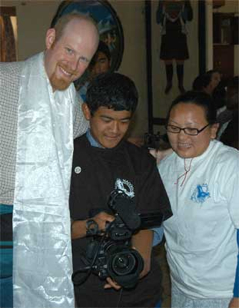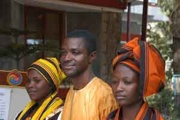
I track the game-developer world to a limited extent (because I work on real-world pervasive games), and today I ran across an article by Andrew Clark in Gamasutra describing what he calls adaptive music. Very few online articles keep me reading from start to finish – and a four-part article is even less likely to do so.
Why did this article intrigue me so much? Well, first, I have been a musician (to some degree) since I was five years old; and second, I’ve been writing educational (computer-based) games and programs since 1978. And I’ve always wanted to incorporate sound and music when it was possible. At the age of 18 I was faced with a flip-the-coin decision between engineering and music. My piano teacher told me that I could embark on a life of music and perhaps if I worked really hard I could make it – but that it was more likely that I’d be a “talented amateur” rather than a successful professional musician. So I went with engineering, and ended up in computer science.
But when personal computers came along, I tried to incorporate music wherever I could. When I started a company (in 1980 – DesignWare) to create educational titles for kids and we started working on the new Apple-II, we had little musical themes that popped out of nowhere when the game started up.
 What Andrew calls adaptive music is the kind of music that appears in today’s video games that “tracks” in some ways the action and stages of the game itself.
What Andrew calls adaptive music is the kind of music that appears in today’s video games that “tracks” in some ways the action and stages of the game itself.

 I interviewed John Sorensen, producer for the
I interviewed John Sorensen, producer for the 
 This is a “cafeteria interview*” of Emmanuel Ande Ivorgba, conducted in New Delhi on Friday, the 30th of March, 2007 at the YWCA. Beginning in 2005, after encountering The Dalai Lama Foundation on the world wide web, Emmanuel began a study circle for adults. This expanded into 14 adult circles and 25 students circles, and centered around 8 schools in Jos, Nigeria.
This is a “cafeteria interview*” of Emmanuel Ande Ivorgba, conducted in New Delhi on Friday, the 30th of March, 2007 at the YWCA. Beginning in 2005, after encountering The Dalai Lama Foundation on the world wide web, Emmanuel began a study circle for adults. This expanded into 14 adult circles and 25 students circles, and centered around 8 schools in Jos, Nigeria. Private schools play an important part in education in Nigeria. Public schools cannot handle the entire load, and students frequently begin school at a late age, so private schools have stepped in to carry part of the load. Students are encouraged to stay in school until they graduate and sometimes do not graduate until as late as the age of 23. (The photo shows Faith, Emmanuel and Mercy at Chonor House in Dharamsala.)
Private schools play an important part in education in Nigeria. Public schools cannot handle the entire load, and students frequently begin school at a late age, so private schools have stepped in to carry part of the load. Students are encouraged to stay in school until they graduate and sometimes do not graduate until as late as the age of 23. (The photo shows Faith, Emmanuel and Mercy at Chonor House in Dharamsala.)